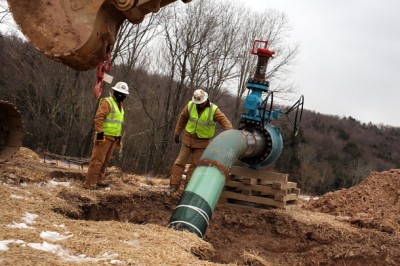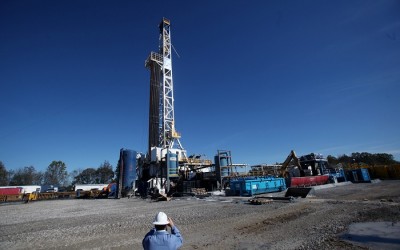The residents of a small Ohio town could lose their water supply if a federal lawsuit filed by a fracking company that has made hundreds of millions of dollars succeeds.
Gulfport Energy is trying to force Barnesville, Ohio, (population 4,100) to sell its water even though the village’s reservoir could be running drying.
Gulfport, which uses the water for fracking, sued when village officials shut off the water supply after the Slope Creek Reservoir started to run dry. Gulfport is a publicly traded company that reported revenues of $671.27 million on Dec. 31, 2014.
“We felt like we had to shut everyone off to protect the regular users,” Barnesville village solicitor (attorney) Marlin Harper told Think Progress. “We don’t have unlimited water.”
Harper contends that an agreement with the company gives Barnesville the right to shut Gulfport’s supply off when water levels run too low. Slope Creek Reservoir’s level was three feet below normal last fall when the water was shut off, and village officials wanted to have enough water for residents.
The reservoir supplies around 12,100 people in Southeastern Ohio with water, including 8,000 people outside the town.
Village Sued for Trying to Protect Water
The company says it has the right to the water.
Ultra-Efficient Water Filter Fits In Your Pocket!
“Barnesville has frustrated Gulfport’s right to develop minerals under the mineral rights agreement by refusing to provide Gulfport with water in violation of Gulfport’s water rights,” the company’s attorney, O. Judson Scheaf, said in a federal lawsuit. Scheaf contends that a 2012 agreement gives Gulfport the right to the water.
Gulfport contends that it could lose millions of dollars in revenue if it does not get the water – and the company says the town is not running dangerously low.
The situation is complicated by a 2012 agreement between Barnesville and another fracking company, Antero Resources. Antero did not withdraw any water from the reservoir last year.
The Shale Play Ohio Valley website reported that Antero agreed to pay Barnesville $5,700 an acre for the water and a 20 percent royalty on any natural gas pumped in the area.
Residents Accuse Company of Threatening Water Supply

Image source: entrepreneur.com
Many residents of Barnesville are upset with Gulfport also because it started drilling for natural gas close to the reservoir. The residents are concerned because fracking releases large amounts of wastewater — polluted water — that could contaminate the reservoir.
Members of a community group called Concerned Barnesville Area Residents believe the reservoir’s level fell so slow because of the amount of water frackers were pumping out of it. The organization even gave Gulfport a petition demanding that they stop.
“We sent a petition signed by 2,500 people to Gulfport asking them to move their drilling pads farther away from the reservoir,” the group’s spokesman, David Castle, told Shale Play.
“It’s one of the best reservoirs in the area,” John Morgan, another spokesman for the group, told Think Progress. “North of us, everything was strip mined years ago, so having a good water supply is valuable here.”
Many Ohio residents are worried about fracking because there could be up to 3,240 oil and gas wells operating in the state by 2019, Cleveland State University reported. Around 63 permits for horizontal drilling used in fracking were issued in Belmont County, where Barnesville is located, in 2013.
‘No Doubt’ Chemicals Getting in Well
Fracking on one natural gas well near Carrolton, Ohio, used 484.5 million tons of chemicals, 10.5 million gallons of water and 5,066 tons of sand, The Akron Beacon Journal reported.
“There’s no doubt that there are some nasty chemicals going into Ohio wells, and no one disputes that,” Jeffrey C. Dick, the chairman of the geology department at Youngstown State University, told The Beacon Journal.
Said Morgan, “Once it’s been used, it is polluted.”
Do you support or oppose fracking? Do you believe it can contaminate water? Share your thoughts in the section below:
The Problem Is Not Just Fracking. Read What Else Is Polluting Your Water.
 Off The Grid News Better Ideas For Off The Grid Living
Off The Grid News Better Ideas For Off The Grid Living



